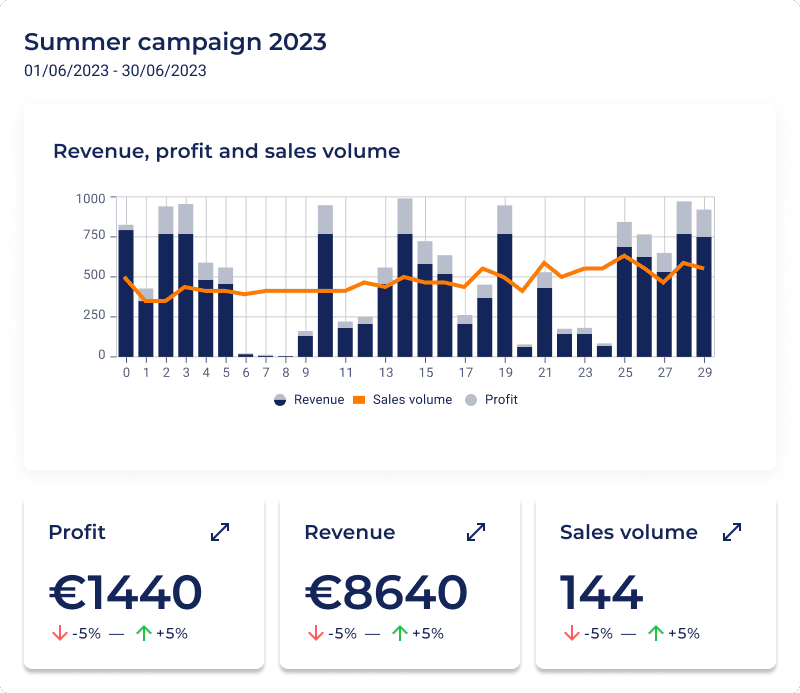Running a successful ecommerce business requires the right set of tools to streamline operations, enhance customer experience, and boost sales. In this listicle, we’ll introduce ten must-have ecommerce tools that every online retailer should consider using. Let’s go!
Table of Contents
The 10 Ecommerce tools you need
1. Website Builders
A user-friendly and feature-rich website builder serves as the foundation upon which you build and operate your online business. Building a website from scratch or hiring a professional web developer can be costly. Website builders provide cost-effective alternatives, as they often come with affordable pricing plans and eliminate the need for custom development, allowing businesses to save on initial setup costs. Choose platforms like Shopify, WooCommerce, or BigCommerce to create an attractive, mobile-responsive, and easy-to-navigate online storefront. Consider what plugins you need and which platforms offer the best integrations with software that you may be currently using.
2. Payment Gateways
Secure and seamless payment processing plays a pivotal role in building trust among customers and ensuring smooth transactions. Customers are more likely to make purchases when they have confidence in the safety and reliability of the payment process. This is where payment gateways like PayPal, Stripe, or Square step in as invaluable tools for ecommerce businesses.
One of the key reasons why payment gateways are crucial is their ability to offer encrypted payment options. With advanced security measures in place, these gateways safeguard sensitive customer data, such as credit card details and personal information, from potential threats and breaches. The encryption ensures that this data is transmitted securely, thereby reducing the risk of fraudulent activities and unauthorized access.
3. Pricing Software
In the fiercely competitive landscape of ecommerce, staying ahead requires businesses to adopt dynamic pricing strategies. Dynamic pricing is a vital approach that allows companies to adjust their prices in real-time based on various factors, such as market demand, competitor prices, and customer behavior. To implement and execute dynamic pricing effectively, ecommerce businesses rely on advanced pricing software tools like Sniffie.
One of the key advantages of dynamic pricing is its role in ensuring businesses stay competitive and maximize profits. In a market where consumers have easy access to price comparisons, maintaining competitive pricing is essential for attracting and retaining customers. By constantly monitoring competitor prices in real-time, pricing software empowers businesses to make data-driven decisions and remain competitive in pricing.
4. Inventory Management Systems
Efficient inventory management is crucial for an ecommerce operation to prevent overselling, maintain adequate stock levels, and ensure timely order fulfillment. Inventory management systems like TradeGecko, DEAR Inventory, or Skubana help businesses streamline their inventory processes, track stock movements, and manage supplier relationships. This ensures that customers receive accurate product availability information and experience a seamless shopping experience, ultimately leading to higher customer satisfaction.
5. Marketing Automation Software
Ecommerce businesses often have extensive customer databases and a need for frequent communication. Marketing automation tools streamline this process by enabling businesses to create and schedule email campaigns, promotions, and newsletters in advance. With the power of automation, businesses can send personalized messages to segmented customer groups, ensuring that the right message reaches the right audience at the most opportune times.
The capability to set up personalized email campaigns is a hallmark feature of marketing automation platforms like HubSpot, Mailchimp, and Klaviyo. Personalized communication is key to capturing the attention of customers in a crowded digital landscape. By leveraging customer data and behavior, businesses can send tailored content, product recommendations, and special offers, which resonate with individual customers on a deeper level. This personal touch fosters a sense of connection and appreciation, leading to increased customer engagement and brand affinity.
Price campaigns easier than ever.
Create campaigns in a few clicks, get insights and recommendations for your products.

6. Customer Relationship Management (CRM)
A CRM system is a valuable tool for managing customer data, interactions, and preferences. In ecommerce, understanding customer behavior and preferences is vital for delivering personalized shopping experiences and providing exceptional customer support. CRM solutions like Salesforce, Zoho CRM, or Pipedrive help businesses gather insights, identify sales opportunities, and tailor marketing efforts to specific customer segments, ultimately increasing customer retention and driving revenue growth.
7. Social Media Management Tools
Social media is a powerful platform for connecting with customers, promoting products, and building brand awareness. Social media management tools like Hootsuite, Buffer, or Sprout Social simplify the management of multiple social media accounts, enabling businesses to schedule posts in advance, engage with their audience, and analyze performance metrics. Consistent and engaging social media presence can help ecommerce businesses reach new customers and foster a loyal online community.
8. Live Chat Support
Real-time customer support is a crucial aspect of providing a seamless shopping experience. LiveChat, Intercom, or Zendesk Chat are all ecommerce tools that allow businesses to offer immediate assistance and address customer queries, leading to increased customer satisfaction and higher conversion rates. By resolving issues promptly, businesses can prevent cart abandonment and build positive customer relationships.
9. Customer Reviews and Testimonials
Customer reviews and testimonials play a significant role in building trust and credibility for an ecommerce business. Review management tools like Trustpilot, Yotpo, or Reviews.io facilitate the collection and showcasing of authentic customer feedback. Positive social proof from satisfied customers can influence potential buyers, instilling confidence in the products or services offered and increasing the likelihood of making a purchase.
10. Shipping and Fulfillment Software
Efficient shipping and order fulfillment are critical for meeting customer expectations and ensuring timely delivery. Ecommerce tools for shipping and fulfillment like ShipStation, ShipBob, or Easyship help businesses optimize their shipping process, calculate accurate shipping costs, and provide customers with real-time tracking information. A seamless fulfillment experience can lead to increased customer satisfaction and encourage repeat business.
Conclusion
With the right ecommerce tools at your disposal, you can streamline operations, enhance customer experience, and drive sales for your online retail business. From building a professional website and managing inventory to automating marketing efforts and providing excellent customer support, these ten essential ecommerce tools offer the necessary foundation for success in the competitive ecommerce landscape. Embrace these powerful solutions and watch your ecommerce venture thrive!


